Analysing COVID-19's Impact on Talent Management at Merrie England
VerifiedAdded on 2023/01/11
|23
|3746
|65
Report
AI Summary
This research project analyzes the impact of COVID-19 on talent management within an organization, using Merrie England Coffee Shop LTD as a case study. The study begins by defining talent management and its benefits, as well as the role of the human resource manager. It then explores the impact of the COVID-19 pandemic on talent management practices, including hiring freezes, altered work plans, and the importance of communication. The research also investigates strategies for organizations to overcome challenges and effectively manage talent during the crisis, such as fostering employee participation and adopting appropriate leadership styles. The methodology includes both primary and secondary research methods, with a focus on a quantitative research design and a survey research strategy. The report concludes with an evaluation of the research methodology and approaches, justifying the choices based on philosophical and theoretical frameworks.
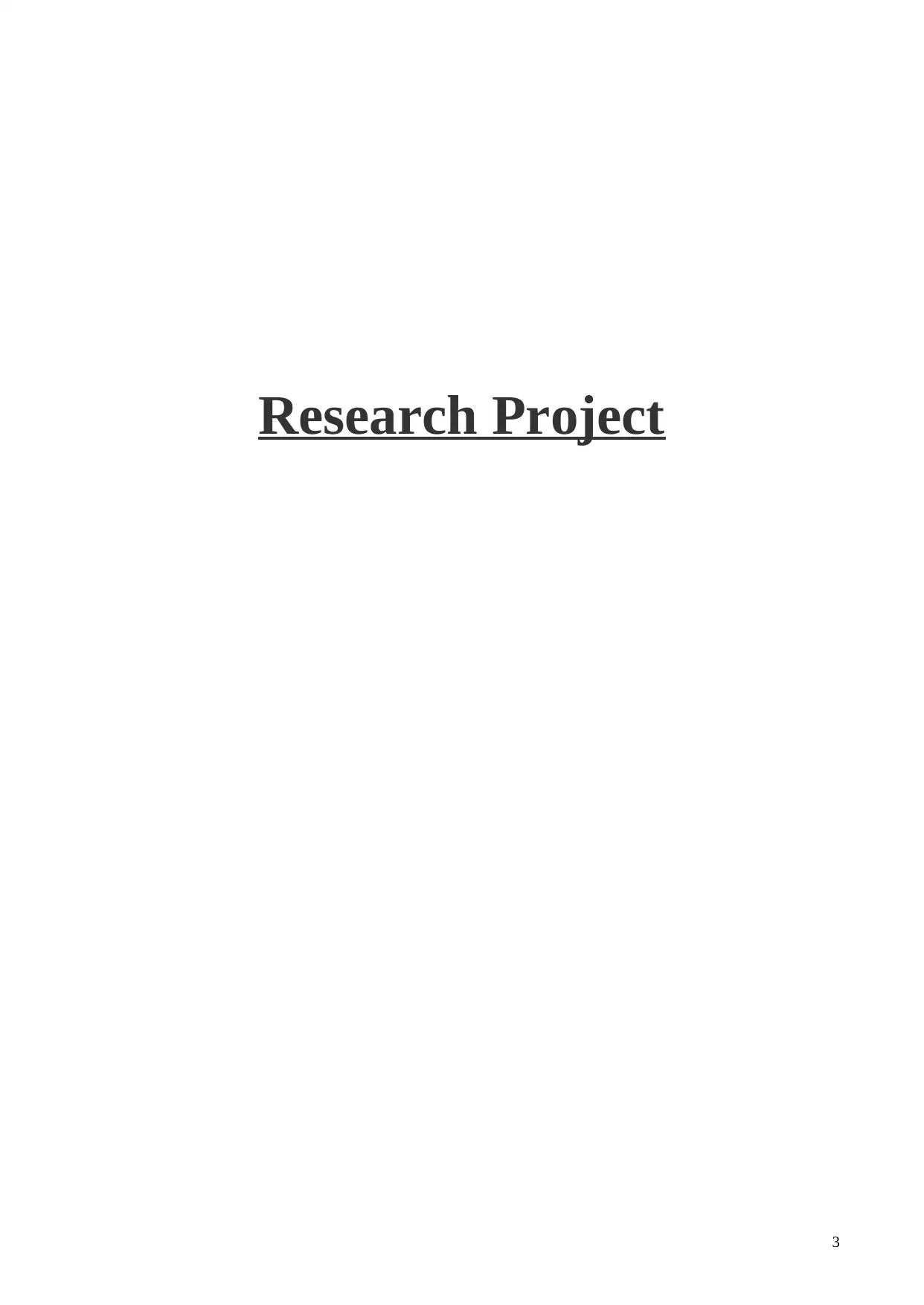
3
Research Project
Research Project
Paraphrase This Document
Need a fresh take? Get an instant paraphrase of this document with our AI Paraphraser
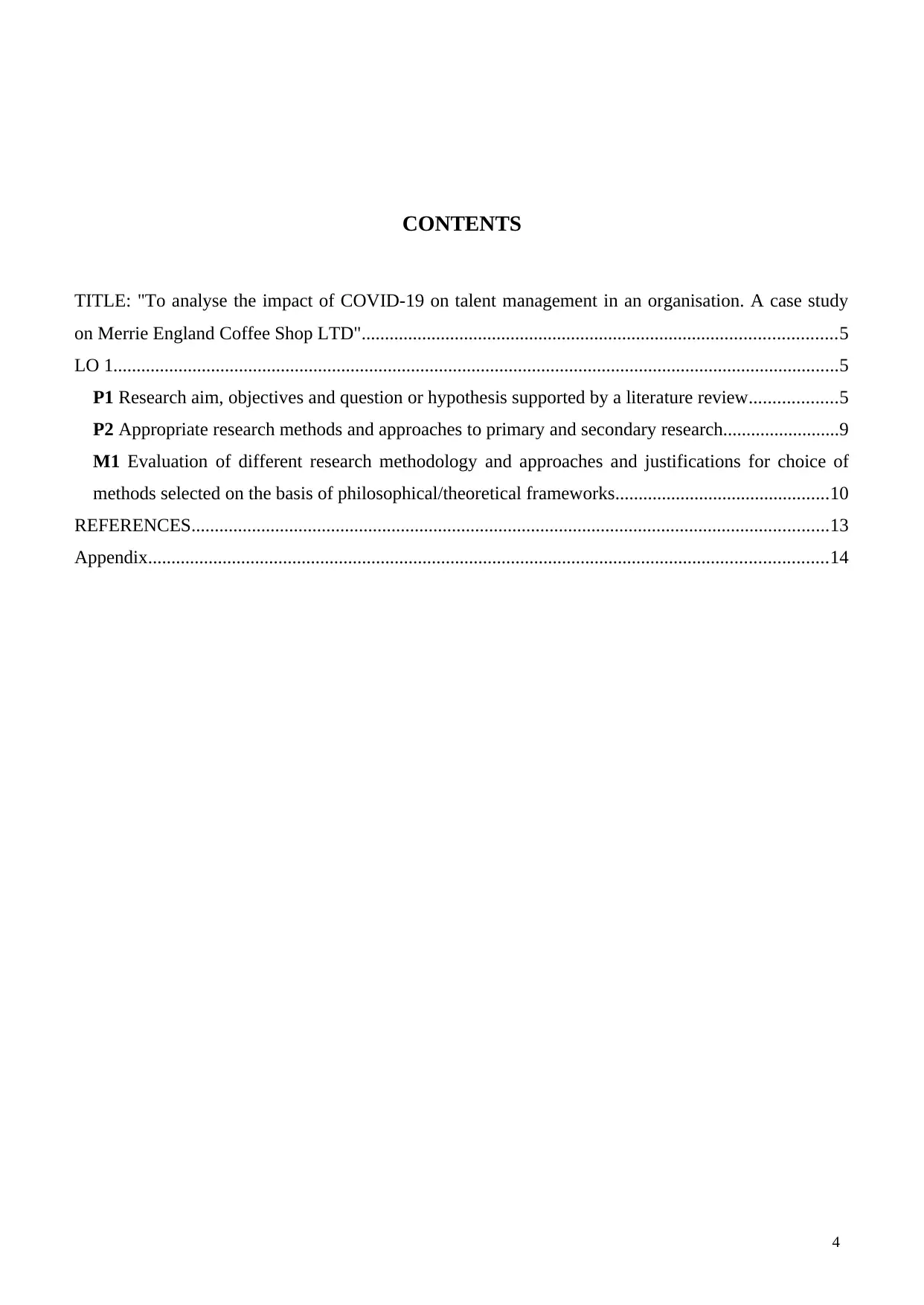
4
CONTENTS
TITLE: "To analyse the impact of COVID-19 on talent management in an organisation. A case study
on Merrie England Coffee Shop LTD"......................................................................................................5
LO 1............................................................................................................................................................5
P1 Research aim, objectives and question or hypothesis supported by a literature review...................5
P2 Appropriate research methods and approaches to primary and secondary research.........................9
M1 Evaluation of different research methodology and approaches and justifications for choice of
methods selected on the basis of philosophical/theoretical frameworks..............................................10
REFERENCES.........................................................................................................................................13
Appendix..................................................................................................................................................14
CONTENTS
TITLE: "To analyse the impact of COVID-19 on talent management in an organisation. A case study
on Merrie England Coffee Shop LTD"......................................................................................................5
LO 1............................................................................................................................................................5
P1 Research aim, objectives and question or hypothesis supported by a literature review...................5
P2 Appropriate research methods and approaches to primary and secondary research.........................9
M1 Evaluation of different research methodology and approaches and justifications for choice of
methods selected on the basis of philosophical/theoretical frameworks..............................................10
REFERENCES.........................................................................................................................................13
Appendix..................................................................................................................................................14
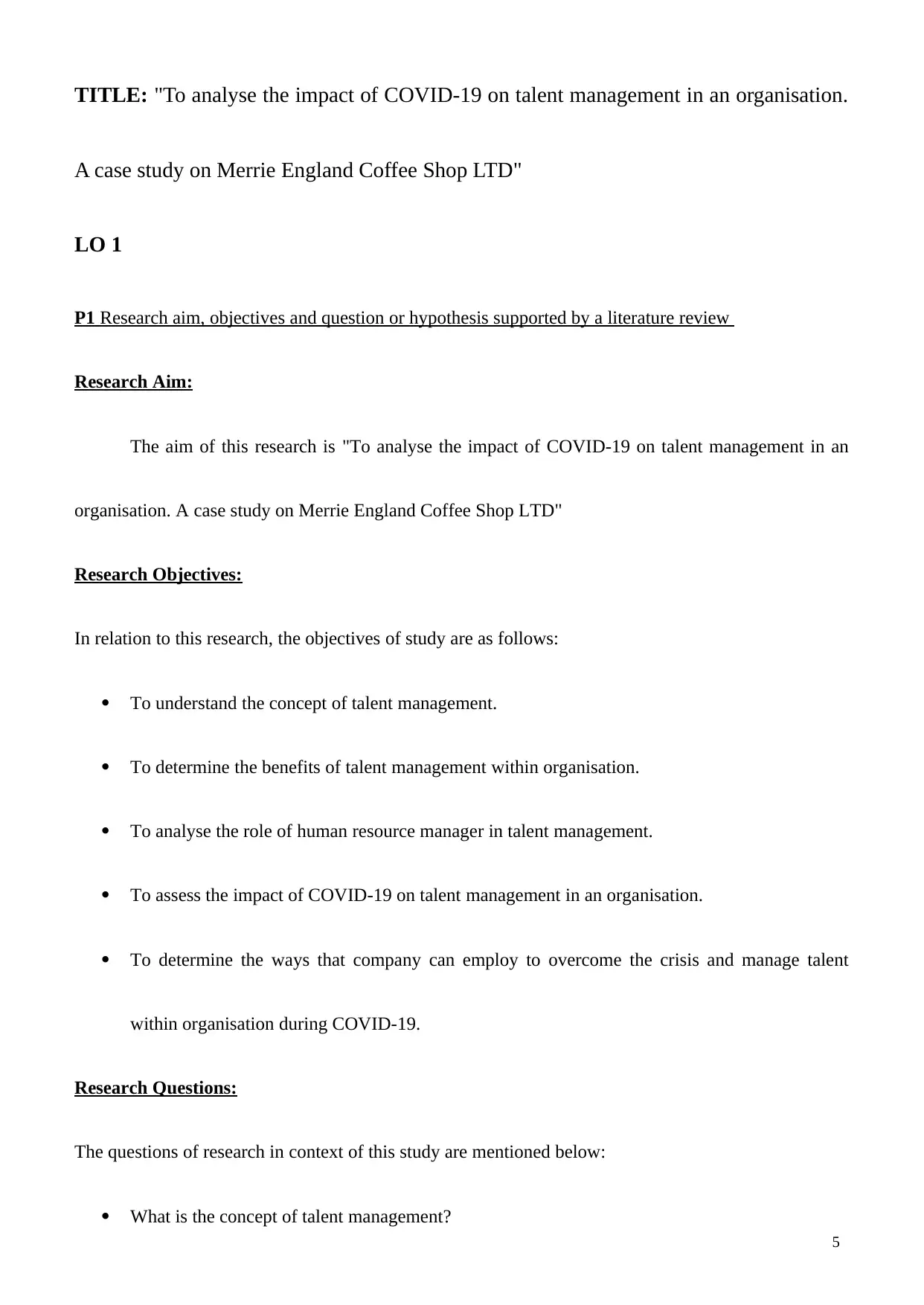
5
TITLE: "To analyse the impact of COVID-19 on talent management in an organisation.
A case study on Merrie England Coffee Shop LTD"
LO 1
P1 Research aim, objectives and question or hypothesis supported by a literature review
Research Aim:
The aim of this research is "To analyse the impact of COVID-19 on talent management in an
organisation. A case study on Merrie England Coffee Shop LTD"
Research Objectives:
In relation to this research, the objectives of study are as follows:
To understand the concept of talent management.
To determine the benefits of talent management within organisation.
To analyse the role of human resource manager in talent management.
To assess the impact of COVID-19 on talent management in an organisation.
To determine the ways that company can employ to overcome the crisis and manage talent
within organisation during COVID-19.
Research Questions:
The questions of research in context of this study are mentioned below:
What is the concept of talent management?
TITLE: "To analyse the impact of COVID-19 on talent management in an organisation.
A case study on Merrie England Coffee Shop LTD"
LO 1
P1 Research aim, objectives and question or hypothesis supported by a literature review
Research Aim:
The aim of this research is "To analyse the impact of COVID-19 on talent management in an
organisation. A case study on Merrie England Coffee Shop LTD"
Research Objectives:
In relation to this research, the objectives of study are as follows:
To understand the concept of talent management.
To determine the benefits of talent management within organisation.
To analyse the role of human resource manager in talent management.
To assess the impact of COVID-19 on talent management in an organisation.
To determine the ways that company can employ to overcome the crisis and manage talent
within organisation during COVID-19.
Research Questions:
The questions of research in context of this study are mentioned below:
What is the concept of talent management?
⊘ This is a preview!⊘
Do you want full access?
Subscribe today to unlock all pages.

Trusted by 1+ million students worldwide
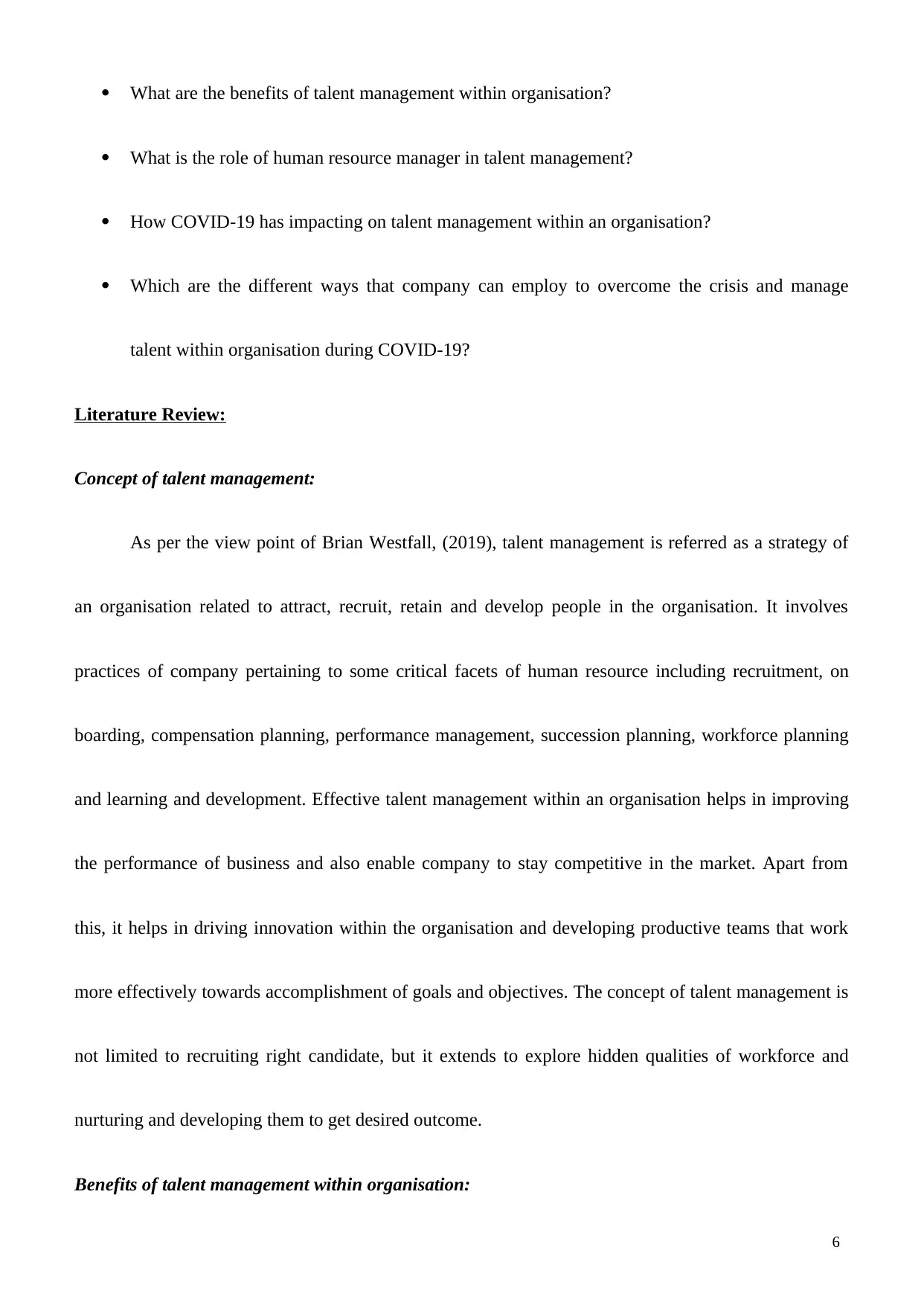
6
What are the benefits of talent management within organisation?
What is the role of human resource manager in talent management?
How COVID-19 has impacting on talent management within an organisation?
Which are the different ways that company can employ to overcome the crisis and manage
talent within organisation during COVID-19?
Literature Review:
Concept of talent management:
As per the view point of Brian Westfall, (2019), talent management is referred as a strategy of
an organisation related to attract, recruit, retain and develop people in the organisation. It involves
practices of company pertaining to some critical facets of human resource including recruitment, on
boarding, compensation planning, performance management, succession planning, workforce planning
and learning and development. Effective talent management within an organisation helps in improving
the performance of business and also enable company to stay competitive in the market. Apart from
this, it helps in driving innovation within the organisation and developing productive teams that work
more effectively towards accomplishment of goals and objectives. The concept of talent management is
not limited to recruiting right candidate, but it extends to explore hidden qualities of workforce and
nurturing and developing them to get desired outcome.
Benefits of talent management within organisation:
What are the benefits of talent management within organisation?
What is the role of human resource manager in talent management?
How COVID-19 has impacting on talent management within an organisation?
Which are the different ways that company can employ to overcome the crisis and manage
talent within organisation during COVID-19?
Literature Review:
Concept of talent management:
As per the view point of Brian Westfall, (2019), talent management is referred as a strategy of
an organisation related to attract, recruit, retain and develop people in the organisation. It involves
practices of company pertaining to some critical facets of human resource including recruitment, on
boarding, compensation planning, performance management, succession planning, workforce planning
and learning and development. Effective talent management within an organisation helps in improving
the performance of business and also enable company to stay competitive in the market. Apart from
this, it helps in driving innovation within the organisation and developing productive teams that work
more effectively towards accomplishment of goals and objectives. The concept of talent management is
not limited to recruiting right candidate, but it extends to explore hidden qualities of workforce and
nurturing and developing them to get desired outcome.
Benefits of talent management within organisation:
Paraphrase This Document
Need a fresh take? Get an instant paraphrase of this document with our AI Paraphraser
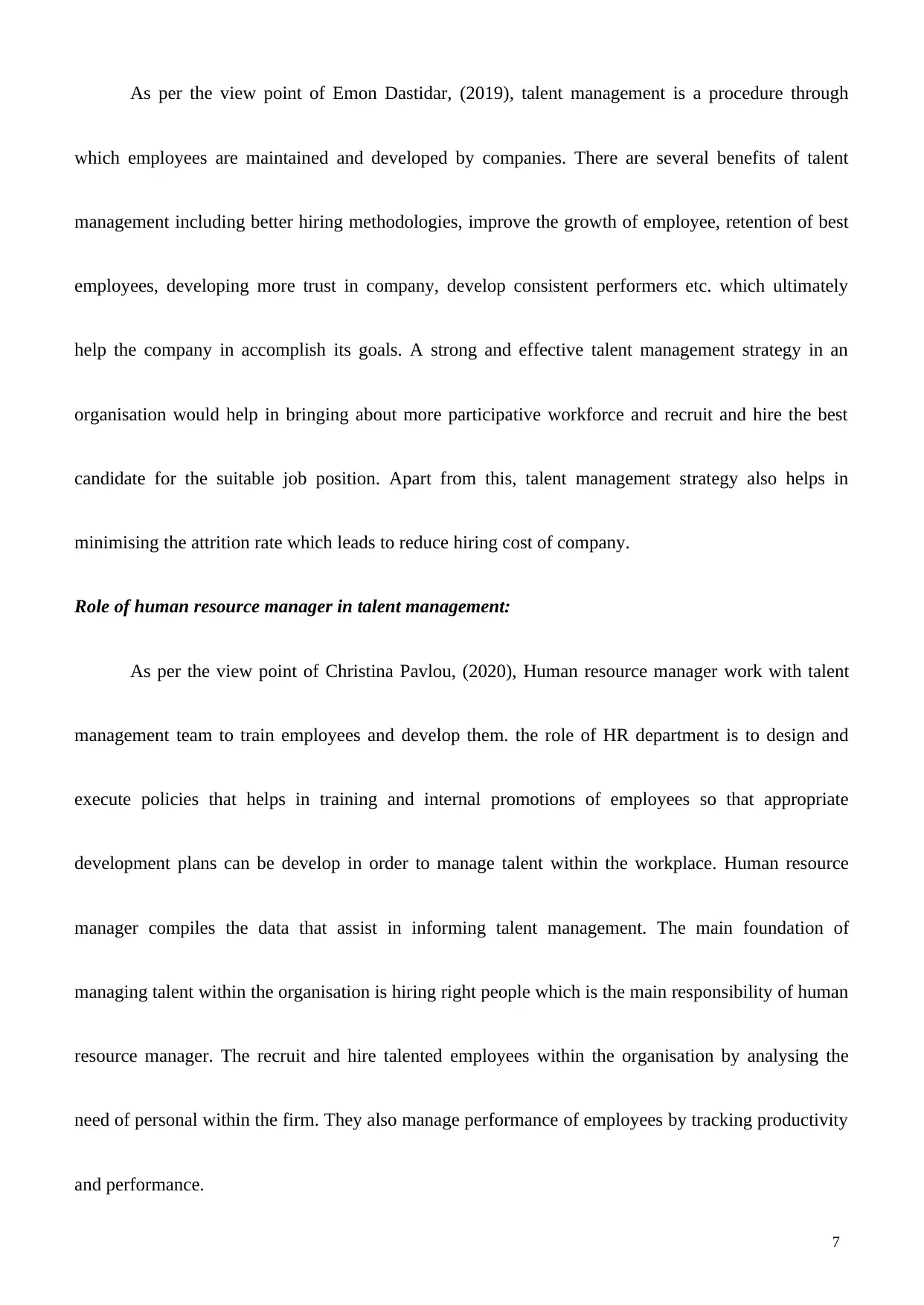
7
As per the view point of Emon Dastidar, (2019), talent management is a procedure through
which employees are maintained and developed by companies. There are several benefits of talent
management including better hiring methodologies, improve the growth of employee, retention of best
employees, developing more trust in company, develop consistent performers etc. which ultimately
help the company in accomplish its goals. A strong and effective talent management strategy in an
organisation would help in bringing about more participative workforce and recruit and hire the best
candidate for the suitable job position. Apart from this, talent management strategy also helps in
minimising the attrition rate which leads to reduce hiring cost of company.
Role of human resource manager in talent management:
As per the view point of Christina Pavlou, (2020), Human resource manager work with talent
management team to train employees and develop them. the role of HR department is to design and
execute policies that helps in training and internal promotions of employees so that appropriate
development plans can be develop in order to manage talent within the workplace. Human resource
manager compiles the data that assist in informing talent management. The main foundation of
managing talent within the organisation is hiring right people which is the main responsibility of human
resource manager. The recruit and hire talented employees within the organisation by analysing the
need of personal within the firm. They also manage performance of employees by tracking productivity
and performance.
As per the view point of Emon Dastidar, (2019), talent management is a procedure through
which employees are maintained and developed by companies. There are several benefits of talent
management including better hiring methodologies, improve the growth of employee, retention of best
employees, developing more trust in company, develop consistent performers etc. which ultimately
help the company in accomplish its goals. A strong and effective talent management strategy in an
organisation would help in bringing about more participative workforce and recruit and hire the best
candidate for the suitable job position. Apart from this, talent management strategy also helps in
minimising the attrition rate which leads to reduce hiring cost of company.
Role of human resource manager in talent management:
As per the view point of Christina Pavlou, (2020), Human resource manager work with talent
management team to train employees and develop them. the role of HR department is to design and
execute policies that helps in training and internal promotions of employees so that appropriate
development plans can be develop in order to manage talent within the workplace. Human resource
manager compiles the data that assist in informing talent management. The main foundation of
managing talent within the organisation is hiring right people which is the main responsibility of human
resource manager. The recruit and hire talented employees within the organisation by analysing the
need of personal within the firm. They also manage performance of employees by tracking productivity
and performance.
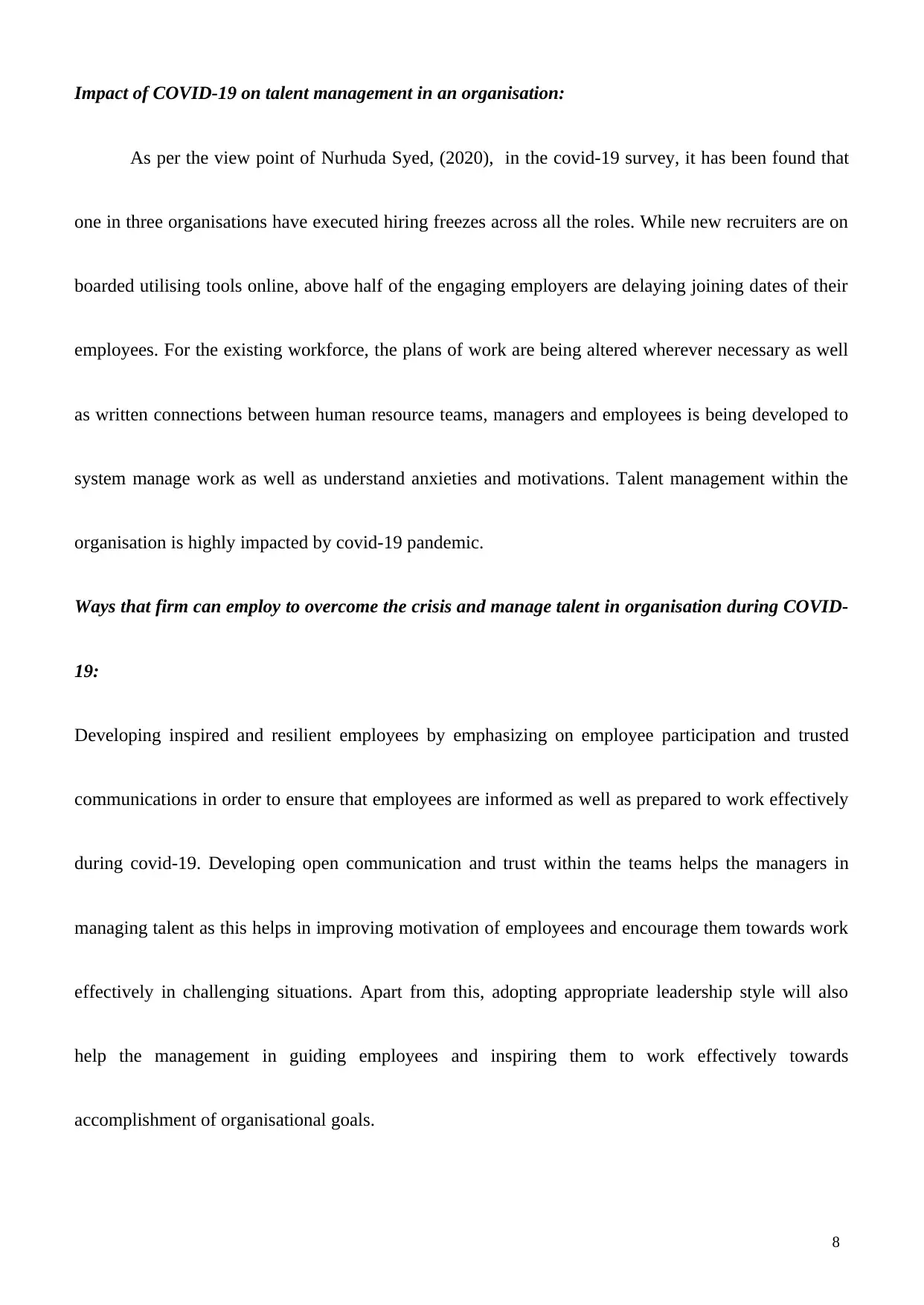
8
Impact of COVID-19 on talent management in an organisation:
As per the view point of Nurhuda Syed, (2020), in the covid-19 survey, it has been found that
one in three organisations have executed hiring freezes across all the roles. While new recruiters are on
boarded utilising tools online, above half of the engaging employers are delaying joining dates of their
employees. For the existing workforce, the plans of work are being altered wherever necessary as well
as written connections between human resource teams, managers and employees is being developed to
system manage work as well as understand anxieties and motivations. Talent management within the
organisation is highly impacted by covid-19 pandemic.
Ways that firm can employ to overcome the crisis and manage talent in organisation during COVID-
19:
Developing inspired and resilient employees by emphasizing on employee participation and trusted
communications in order to ensure that employees are informed as well as prepared to work effectively
during covid-19. Developing open communication and trust within the teams helps the managers in
managing talent as this helps in improving motivation of employees and encourage them towards work
effectively in challenging situations. Apart from this, adopting appropriate leadership style will also
help the management in guiding employees and inspiring them to work effectively towards
accomplishment of organisational goals.
Impact of COVID-19 on talent management in an organisation:
As per the view point of Nurhuda Syed, (2020), in the covid-19 survey, it has been found that
one in three organisations have executed hiring freezes across all the roles. While new recruiters are on
boarded utilising tools online, above half of the engaging employers are delaying joining dates of their
employees. For the existing workforce, the plans of work are being altered wherever necessary as well
as written connections between human resource teams, managers and employees is being developed to
system manage work as well as understand anxieties and motivations. Talent management within the
organisation is highly impacted by covid-19 pandemic.
Ways that firm can employ to overcome the crisis and manage talent in organisation during COVID-
19:
Developing inspired and resilient employees by emphasizing on employee participation and trusted
communications in order to ensure that employees are informed as well as prepared to work effectively
during covid-19. Developing open communication and trust within the teams helps the managers in
managing talent as this helps in improving motivation of employees and encourage them towards work
effectively in challenging situations. Apart from this, adopting appropriate leadership style will also
help the management in guiding employees and inspiring them to work effectively towards
accomplishment of organisational goals.
⊘ This is a preview!⊘
Do you want full access?
Subscribe today to unlock all pages.

Trusted by 1+ million students worldwide
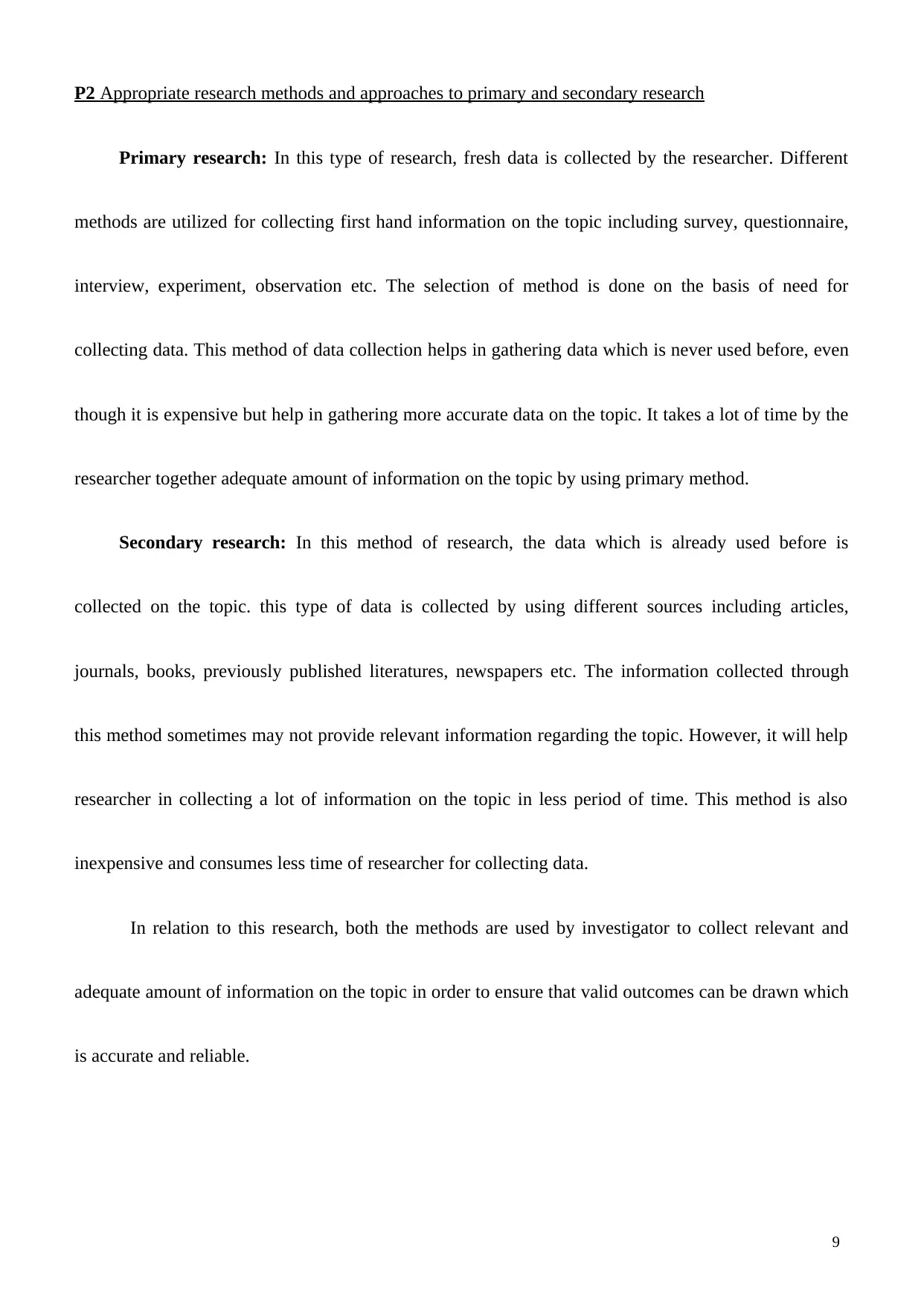
9
P2 Appropriate research methods and approaches to primary and secondary research
Primary research: In this type of research, fresh data is collected by the researcher. Different
methods are utilized for collecting first hand information on the topic including survey, questionnaire,
interview, experiment, observation etc. The selection of method is done on the basis of need for
collecting data. This method of data collection helps in gathering data which is never used before, even
though it is expensive but help in gathering more accurate data on the topic. It takes a lot of time by the
researcher together adequate amount of information on the topic by using primary method.
Secondary research: In this method of research, the data which is already used before is
collected on the topic. this type of data is collected by using different sources including articles,
journals, books, previously published literatures, newspapers etc. The information collected through
this method sometimes may not provide relevant information regarding the topic. However, it will help
researcher in collecting a lot of information on the topic in less period of time. This method is also
inexpensive and consumes less time of researcher for collecting data.
In relation to this research, both the methods are used by investigator to collect relevant and
adequate amount of information on the topic in order to ensure that valid outcomes can be drawn which
is accurate and reliable.
P2 Appropriate research methods and approaches to primary and secondary research
Primary research: In this type of research, fresh data is collected by the researcher. Different
methods are utilized for collecting first hand information on the topic including survey, questionnaire,
interview, experiment, observation etc. The selection of method is done on the basis of need for
collecting data. This method of data collection helps in gathering data which is never used before, even
though it is expensive but help in gathering more accurate data on the topic. It takes a lot of time by the
researcher together adequate amount of information on the topic by using primary method.
Secondary research: In this method of research, the data which is already used before is
collected on the topic. this type of data is collected by using different sources including articles,
journals, books, previously published literatures, newspapers etc. The information collected through
this method sometimes may not provide relevant information regarding the topic. However, it will help
researcher in collecting a lot of information on the topic in less period of time. This method is also
inexpensive and consumes less time of researcher for collecting data.
In relation to this research, both the methods are used by investigator to collect relevant and
adequate amount of information on the topic in order to ensure that valid outcomes can be drawn which
is accurate and reliable.
Paraphrase This Document
Need a fresh take? Get an instant paraphrase of this document with our AI Paraphraser
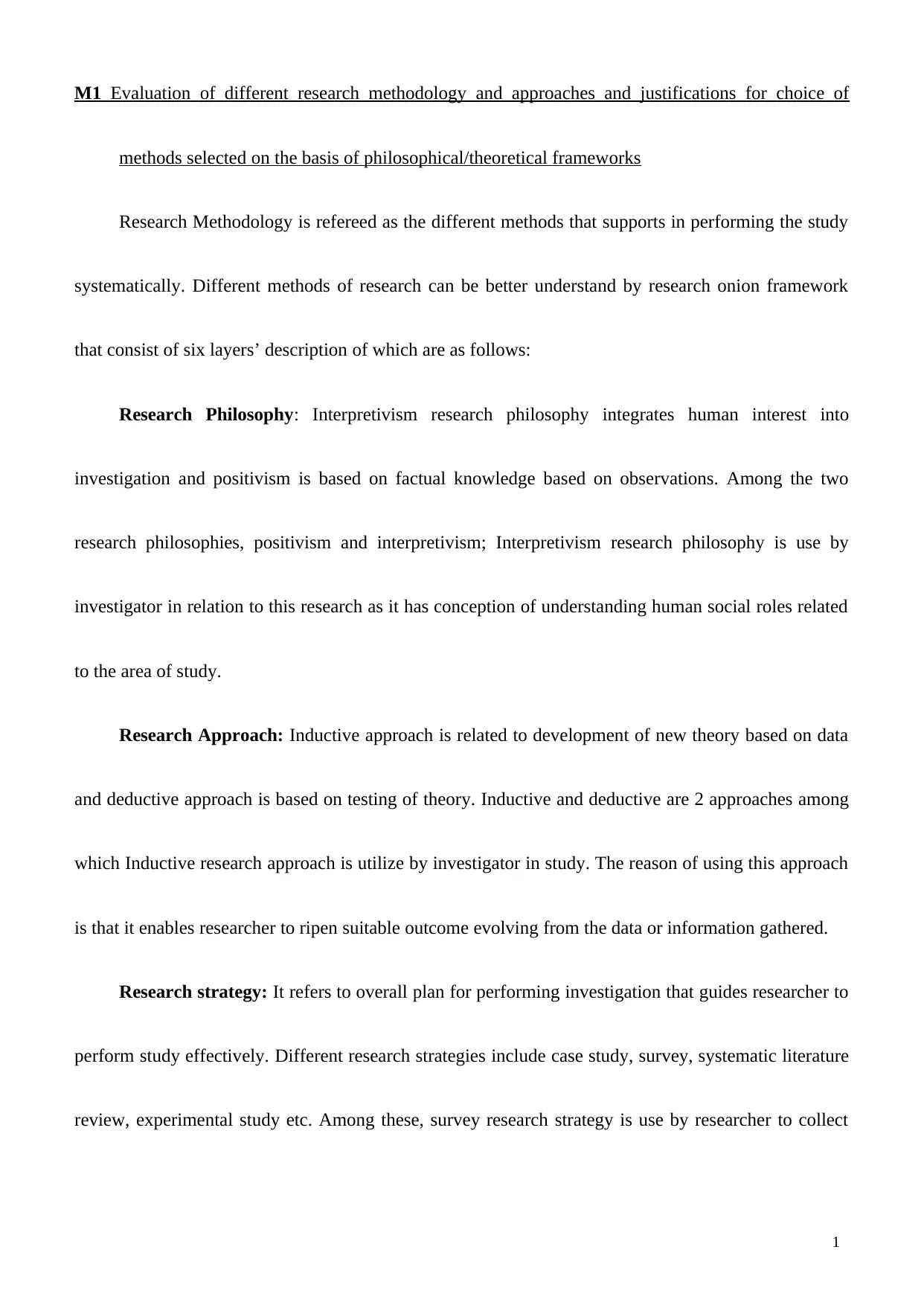
1
0
M1 Evaluation of different research methodology and approaches and justifications for choice of
methods selected on the basis of philosophical/theoretical frameworks
Research Methodology is refereed as the different methods that supports in performing the study
systematically. Different methods of research can be better understand by research onion framework
that consist of six layers’ description of which are as follows:
Research Philosophy: Interpretivism research philosophy integrates human interest into
investigation and positivism is based on factual knowledge based on observations. Among the two
research philosophies, positivism and interpretivism; Interpretivism research philosophy is use by
investigator in relation to this research as it has conception of understanding human social roles related
to the area of study.
Research Approach: Inductive approach is related to development of new theory based on data
and deductive approach is based on testing of theory. Inductive and deductive are 2 approaches among
which Inductive research approach is utilize by investigator in study. The reason of using this approach
is that it enables researcher to ripen suitable outcome evolving from the data or information gathered.
Research strategy: It refers to overall plan for performing investigation that guides researcher to
perform study effectively. Different research strategies include case study, survey, systematic literature
review, experimental study etc. Among these, survey research strategy is use by researcher to collect
0
M1 Evaluation of different research methodology and approaches and justifications for choice of
methods selected on the basis of philosophical/theoretical frameworks
Research Methodology is refereed as the different methods that supports in performing the study
systematically. Different methods of research can be better understand by research onion framework
that consist of six layers’ description of which are as follows:
Research Philosophy: Interpretivism research philosophy integrates human interest into
investigation and positivism is based on factual knowledge based on observations. Among the two
research philosophies, positivism and interpretivism; Interpretivism research philosophy is use by
investigator in relation to this research as it has conception of understanding human social roles related
to the area of study.
Research Approach: Inductive approach is related to development of new theory based on data
and deductive approach is based on testing of theory. Inductive and deductive are 2 approaches among
which Inductive research approach is utilize by investigator in study. The reason of using this approach
is that it enables researcher to ripen suitable outcome evolving from the data or information gathered.
Research strategy: It refers to overall plan for performing investigation that guides researcher to
perform study effectively. Different research strategies include case study, survey, systematic literature
review, experimental study etc. Among these, survey research strategy is use by researcher to collect
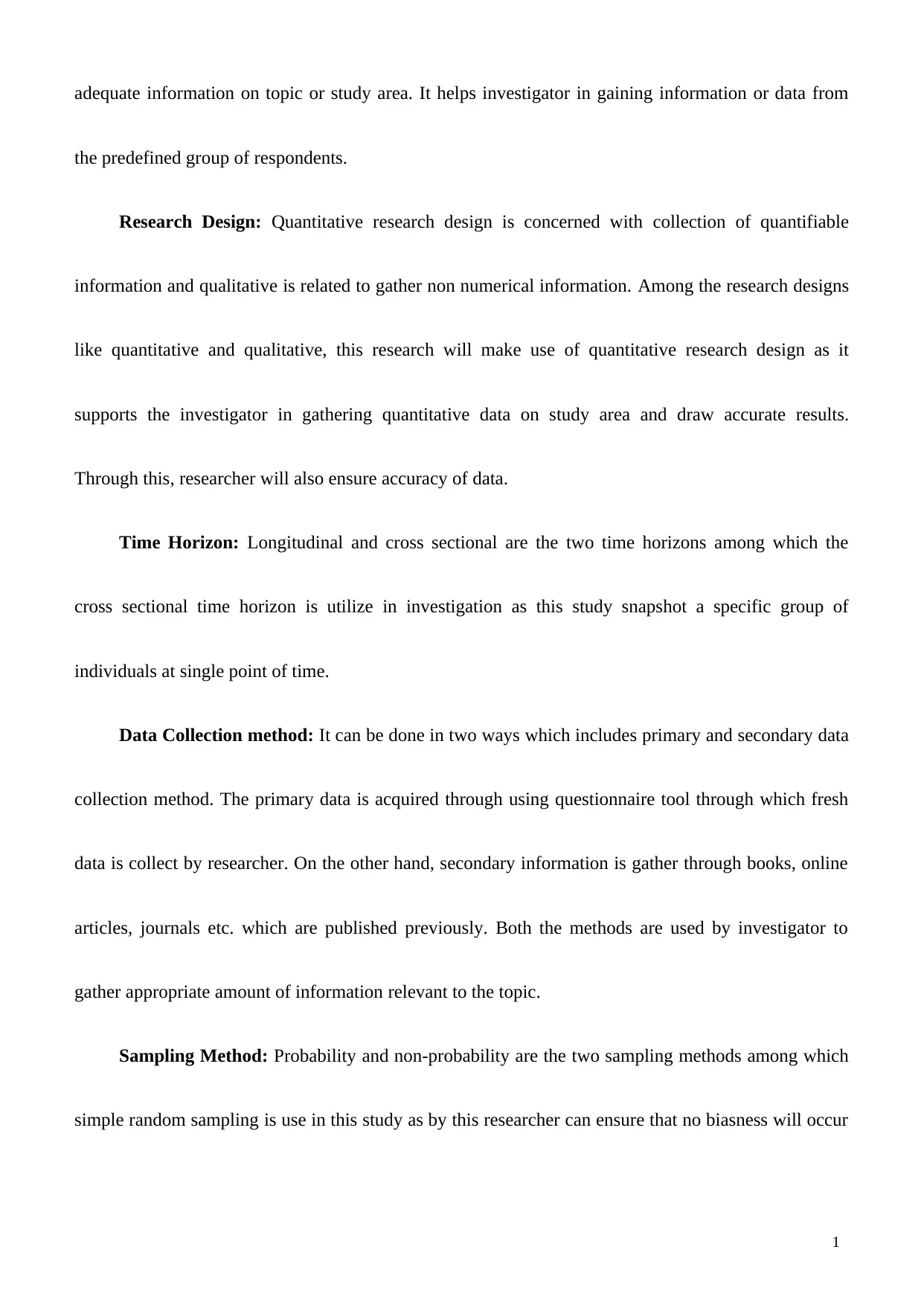
1
1
adequate information on topic or study area. It helps investigator in gaining information or data from
the predefined group of respondents.
Research Design: Quantitative research design is concerned with collection of quantifiable
information and qualitative is related to gather non numerical information. Among the research designs
like quantitative and qualitative, this research will make use of quantitative research design as it
supports the investigator in gathering quantitative data on study area and draw accurate results.
Through this, researcher will also ensure accuracy of data.
Time Horizon: Longitudinal and cross sectional are the two time horizons among which the
cross sectional time horizon is utilize in investigation as this study snapshot a specific group of
individuals at single point of time.
Data Collection method: It can be done in two ways which includes primary and secondary data
collection method. The primary data is acquired through using questionnaire tool through which fresh
data is collect by researcher. On the other hand, secondary information is gather through books, online
articles, journals etc. which are published previously. Both the methods are used by investigator to
gather appropriate amount of information relevant to the topic.
Sampling Method: Probability and non-probability are the two sampling methods among which
simple random sampling is use in this study as by this researcher can ensure that no biasness will occur
1
adequate information on topic or study area. It helps investigator in gaining information or data from
the predefined group of respondents.
Research Design: Quantitative research design is concerned with collection of quantifiable
information and qualitative is related to gather non numerical information. Among the research designs
like quantitative and qualitative, this research will make use of quantitative research design as it
supports the investigator in gathering quantitative data on study area and draw accurate results.
Through this, researcher will also ensure accuracy of data.
Time Horizon: Longitudinal and cross sectional are the two time horizons among which the
cross sectional time horizon is utilize in investigation as this study snapshot a specific group of
individuals at single point of time.
Data Collection method: It can be done in two ways which includes primary and secondary data
collection method. The primary data is acquired through using questionnaire tool through which fresh
data is collect by researcher. On the other hand, secondary information is gather through books, online
articles, journals etc. which are published previously. Both the methods are used by investigator to
gather appropriate amount of information relevant to the topic.
Sampling Method: Probability and non-probability are the two sampling methods among which
simple random sampling is use in this study as by this researcher can ensure that no biasness will occur
⊘ This is a preview!⊘
Do you want full access?
Subscribe today to unlock all pages.

Trusted by 1+ million students worldwide
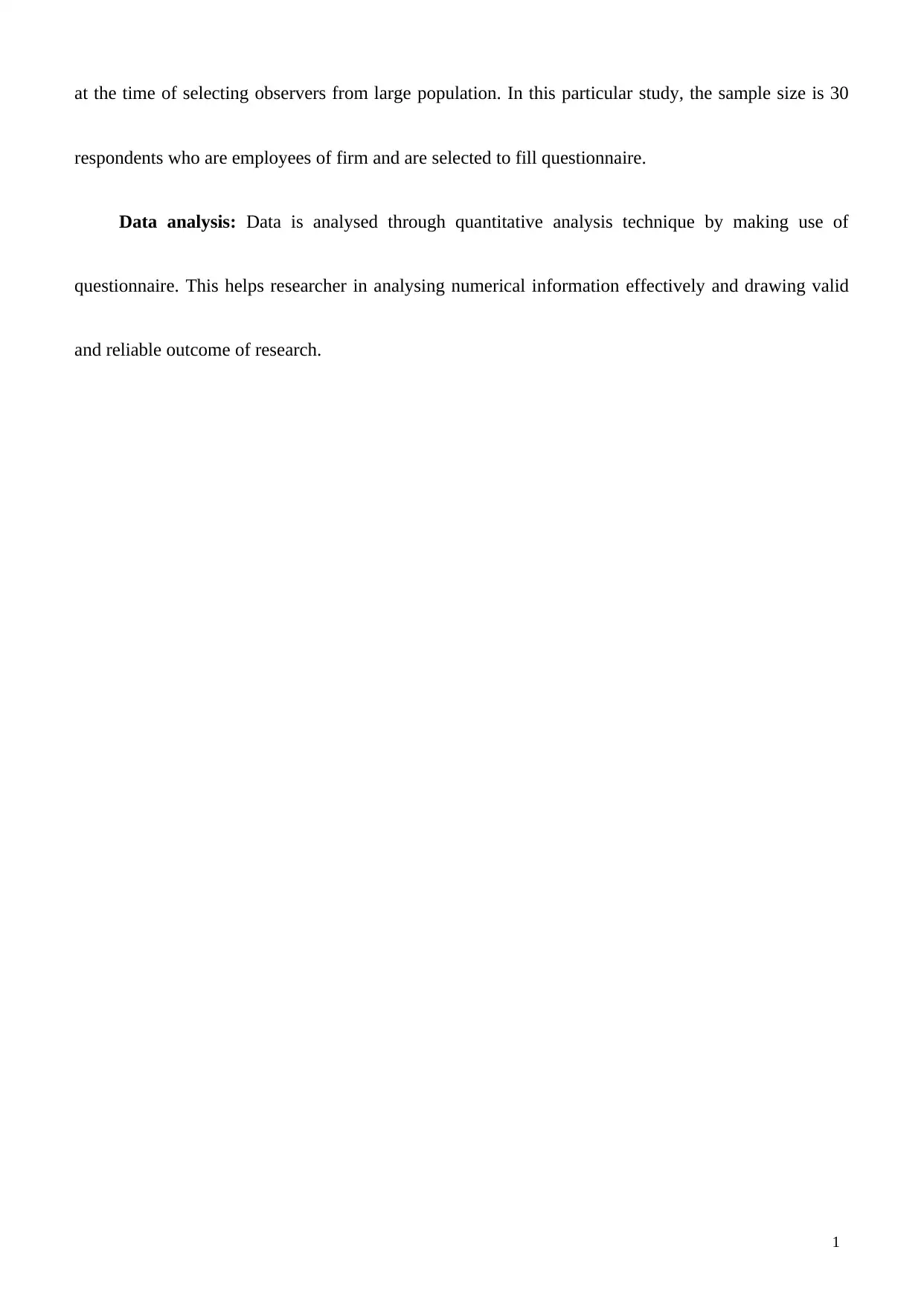
1
2
at the time of selecting observers from large population. In this particular study, the sample size is 30
respondents who are employees of firm and are selected to fill questionnaire.
Data analysis: Data is analysed through quantitative analysis technique by making use of
questionnaire. This helps researcher in analysing numerical information effectively and drawing valid
and reliable outcome of research.
2
at the time of selecting observers from large population. In this particular study, the sample size is 30
respondents who are employees of firm and are selected to fill questionnaire.
Data analysis: Data is analysed through quantitative analysis technique by making use of
questionnaire. This helps researcher in analysing numerical information effectively and drawing valid
and reliable outcome of research.
Paraphrase This Document
Need a fresh take? Get an instant paraphrase of this document with our AI Paraphraser
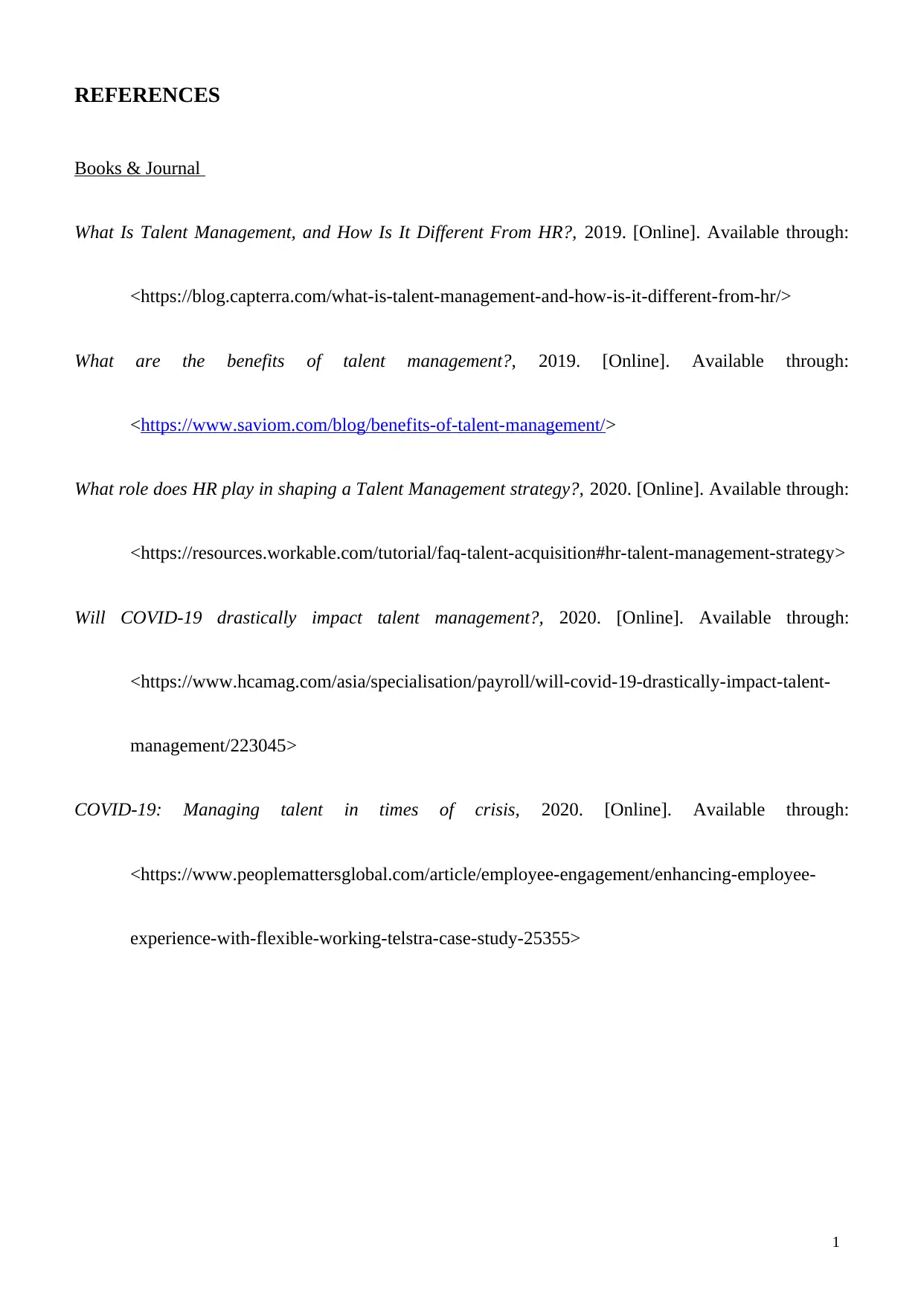
1
3
REFERENCES
Books & Journal
What Is Talent Management, and How Is It Different From HR?, 2019. [Online]. Available through:
<https://blog.capterra.com/what-is-talent-management-and-how-is-it-different-from-hr/>
What are the benefits of talent management?, 2019. [Online]. Available through:
<https://www.saviom.com/blog/benefits-of-talent-management/>
What role does HR play in shaping a Talent Management strategy?, 2020. [Online]. Available through:
<https://resources.workable.com/tutorial/faq-talent-acquisition#hr-talent-management-strategy>
Will COVID-19 drastically impact talent management?, 2020. [Online]. Available through:
<https://www.hcamag.com/asia/specialisation/payroll/will-covid-19-drastically-impact-talent-
management/223045>
COVID-19: Managing talent in times of crisis, 2020. [Online]. Available through:
<https://www.peoplemattersglobal.com/article/employee-engagement/enhancing-employee-
experience-with-flexible-working-telstra-case-study-25355>
3
REFERENCES
Books & Journal
What Is Talent Management, and How Is It Different From HR?, 2019. [Online]. Available through:
<https://blog.capterra.com/what-is-talent-management-and-how-is-it-different-from-hr/>
What are the benefits of talent management?, 2019. [Online]. Available through:
<https://www.saviom.com/blog/benefits-of-talent-management/>
What role does HR play in shaping a Talent Management strategy?, 2020. [Online]. Available through:
<https://resources.workable.com/tutorial/faq-talent-acquisition#hr-talent-management-strategy>
Will COVID-19 drastically impact talent management?, 2020. [Online]. Available through:
<https://www.hcamag.com/asia/specialisation/payroll/will-covid-19-drastically-impact-talent-
management/223045>
COVID-19: Managing talent in times of crisis, 2020. [Online]. Available through:
<https://www.peoplemattersglobal.com/article/employee-engagement/enhancing-employee-
experience-with-flexible-working-telstra-case-study-25355>
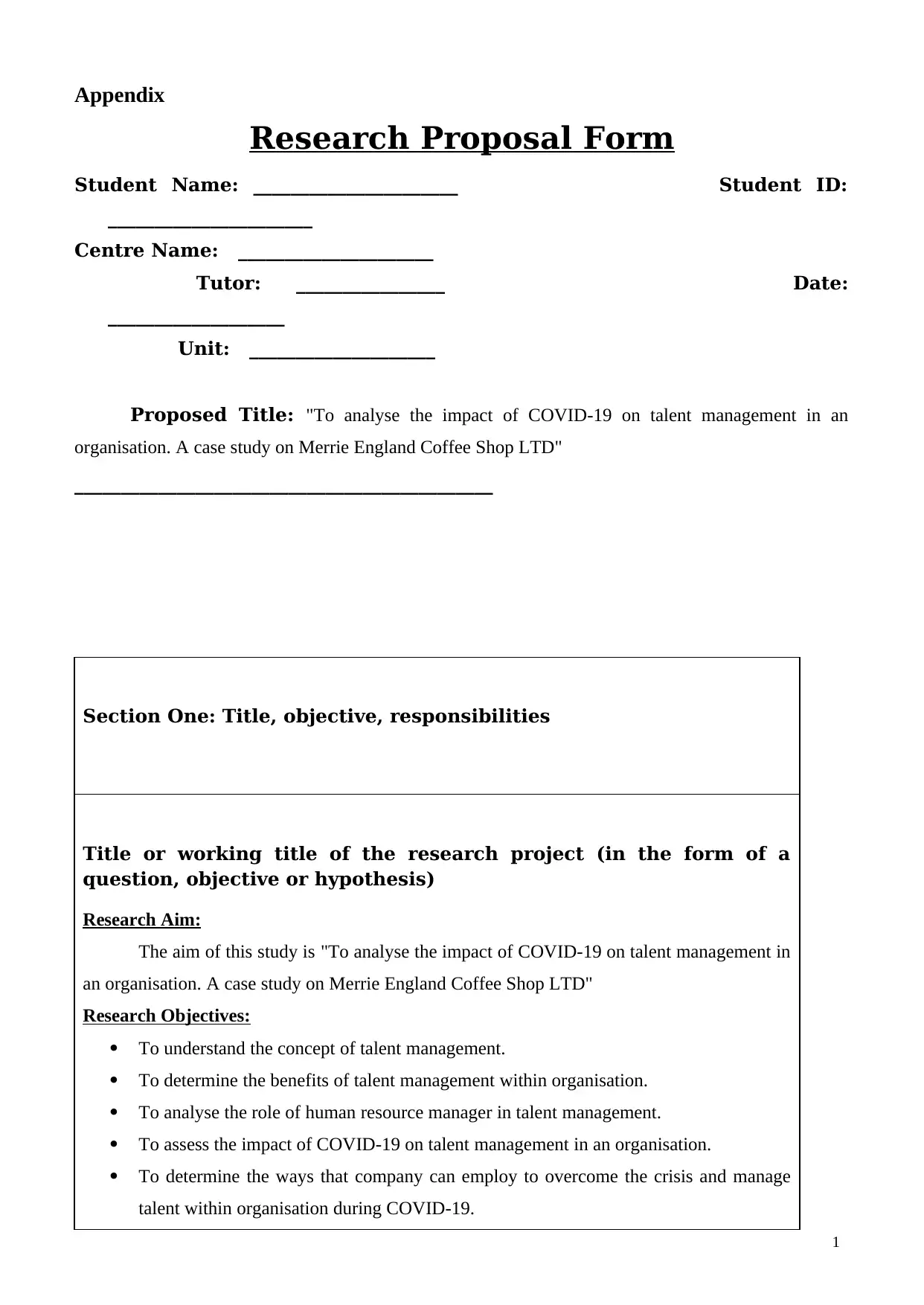
1
4
Appendix
Research Proposal Form
Student Name: ______________________ Student ID:
______________________
Centre Name: _____________________
Tutor: ________________ Date:
___________________
Unit: ____________________
Proposed Title: "To analyse the impact of COVID-19 on talent management in an
organisation. A case study on Merrie England Coffee Shop LTD"
_____________________________________________
Section One: Title, objective, responsibilities
Title or working title of the research project (in the form of a
question, objective or hypothesis)
Research Aim:
The aim of this study is "To analyse the impact of COVID-19 on talent management in
an organisation. A case study on Merrie England Coffee Shop LTD"
Research Objectives:
To understand the concept of talent management.
To determine the benefits of talent management within organisation.
To analyse the role of human resource manager in talent management.
To assess the impact of COVID-19 on talent management in an organisation.
To determine the ways that company can employ to overcome the crisis and manage
talent within organisation during COVID-19.
4
Appendix
Research Proposal Form
Student Name: ______________________ Student ID:
______________________
Centre Name: _____________________
Tutor: ________________ Date:
___________________
Unit: ____________________
Proposed Title: "To analyse the impact of COVID-19 on talent management in an
organisation. A case study on Merrie England Coffee Shop LTD"
_____________________________________________
Section One: Title, objective, responsibilities
Title or working title of the research project (in the form of a
question, objective or hypothesis)
Research Aim:
The aim of this study is "To analyse the impact of COVID-19 on talent management in
an organisation. A case study on Merrie England Coffee Shop LTD"
Research Objectives:
To understand the concept of talent management.
To determine the benefits of talent management within organisation.
To analyse the role of human resource manager in talent management.
To assess the impact of COVID-19 on talent management in an organisation.
To determine the ways that company can employ to overcome the crisis and manage
talent within organisation during COVID-19.
⊘ This is a preview!⊘
Do you want full access?
Subscribe today to unlock all pages.

Trusted by 1+ million students worldwide
1 out of 23
Related Documents
Your All-in-One AI-Powered Toolkit for Academic Success.
+13062052269
info@desklib.com
Available 24*7 on WhatsApp / Email
![[object Object]](/_next/static/media/star-bottom.7253800d.svg)
Unlock your academic potential
Copyright © 2020–2026 A2Z Services. All Rights Reserved. Developed and managed by ZUCOL.





